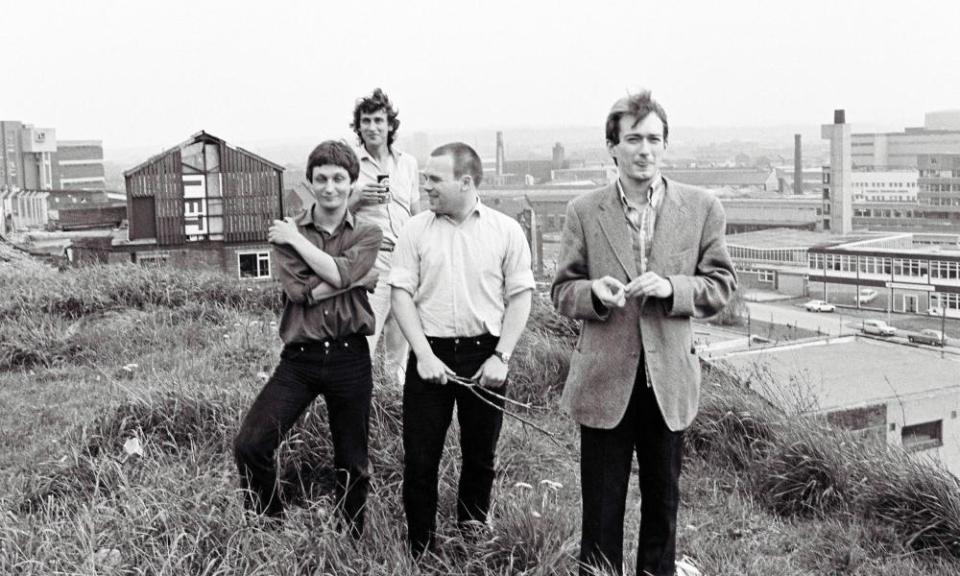Andy Gill: Gang of Four to release guitarist's final recordings
The influential post-punk band Gang of Four are to release the final recordings featuring the group’s influential guitarist and songwriter Andy Gill, who died in February. All proceeds from the Anti Hero EP will benefit Guy’s and St Thomas’ NHS foundation trust, to “recognise, celebrate and support” those who cared for Gill during his hospitalisation.
Gill’s widow, the author and Women’s Equality party co-founder Catherine Mayer, said her late husband was “was working on this music and overseeing mixes from his hospital bed until literally the last day when they put him under”.
Related: Andy Gill: genius guitarist who burned a route out of punk | Alexis Petridis
Mayer and the surviving members of Gang of Four named the EP to recognise Gill’s “very healthy scepticism of the lauding of so-called great men”, she said. “So many – mainly men I’m afraid – seem susceptible to the idea that if you behave and dress a bit badly and break the rules, it makes you a genius. Andy talked about how it was becoming impossible for such populist figures to not intrude into his lyrics. He’d look at Trump’s tweets and go, ‘There’s a Gang of Four lyric right there.’”
Although Gill’s official cause of death was multiple organ failure and pneumonia, Mayer has said that she suspects that the guitarist – who toured China with Gang of Four in November – may have been an early UK victim of Covid-19. In early December, the band’s tour manager was admitted to hospital for eight days with “severe respiratory distress”. When Gill became ill in January “nobody at that point thought coronavirus had reached Europe”, says Mayer. She has found that watching news broadcasts of coronavirus victims recounting similar symptoms was “like watching Andy die again”.
She hopes that re-testing Gill’s samples, along with those of the tour manager – who she says experienced “severe respiratory distress” in December” – herself and Gang of Four’s members, for antibodies may provide answers. “It won’t help Andy, but may help understand what the timelines really were and what that means the public health response was, and how big a failure it was not to continue with containment and track and trace,” she says.

Gill was famously political and often worked Marxist ideas into his lyrics. Mayer said that while he felt resourcing the NHS should not fall to individuals, she “could not think of a better team of people” to receive extra funding. Gill had been treated by the hospital for inflammatory condition sarcoidosis since 2012. He was admitted with respiratory issues in January. Mayer said she and his bandmates were touched to be able to stay overnight in the hospital, and witness the specialists who treated Gill for sarcoidosis treat him for pneumonia and “see him through until the end”.
Mayer said: “I’d never been in an intensive care unit before and it really is an extraordinary place. There’s something about the combination of compassion and humanity at the same time as an astonishing level of expertise. I’ve been acutely aware that those people who put so much emotional commitment into looking after Andy are so undervalued.”
The Anti Hero EP, released on 17 July, features art work by Shepard Fairey, creator of Barack Obama’s Hope poster, who offered to create a portrait of Gill following his death. He said: “Gang of Four have been a profound inspiration for me because the band demonstrate that great art can powerfully merge pleasure and intellectual provocation. I was honoured to create an iconic image of one of my heroes.”
John Sterry wrote the album’s second single, Day Turns to Night, as a tribute to his friend and mentor. Written shortly after Gill’s death, it was not intended for release until Mayer “heard it, cried for an hour, then insisted he include it”, she said. Sterry, who joined the veteran post-punk band’s remodelled line-up in 2012, explained that the “unfiltered and honest” lyrics “poured out in half an hour”.
Bassist/producer Thomas McNeice found the song too raw to work on at first. “I had stop on the first day because the lyrics just got me,” he said. The EP also includes new versions of Gang of Four’s 1979 track Glass and 2019’s Change the Locks. While the rerecordings were made in late 2019, Mayer said the songs’ themes of security and civil liberty resonated with the current lockdown.
Related: Pubs, disco and fighting Nazis: how Leeds nurtured British post-punk
Mayer recently led a “socially distanced protest march” on Downing Street to campaign about the crisis in care homes and personal protective equipment. She said she was appalled that Dominic Cummings undermined the lockdown with his trip to Durham.
Gang of Four remain one of the most influential post-punk groups of all time. Formed in Leeds in 1976, they never had a Top 40 hit but their 1979 debut Entertainment! influenced artists from REM to U2, the Jam and St Vincent. Kurt Cobain once described his band Nirvana as “a Gang of Four and Scratch Acid ripoff”. INXS’s Michael Hutchence called them “art meets the devil via James Brown”.

 Yahoo News
Yahoo News 
